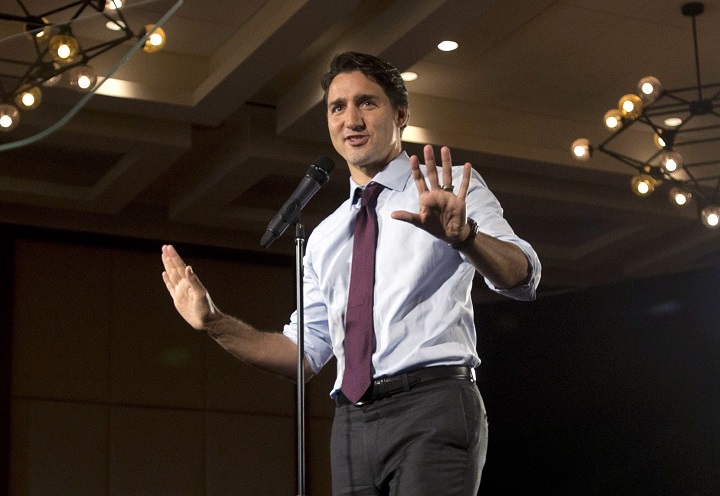TORONTO – The Liberals would revise the numbers on their promise to run annual deficits over the next three years if the economy takes a dramatic fall, party leader Justin Trudeau said Monday.

During a town hall-style rally in downtown Toronto, Trudeau said his party would re-examine its commitment to running $10-billion deficits annually before balancing the books in 2019 if the country’s economic situation becomes “radically worse.”
“We always said we would run modest deficits,” Trudeau said. “And we also said if the situation becomes radically worse, we would revise those numbers.”
Many of the Liberals’ election promises hinge on Trudeau’s plan to borrow tens of billions of dollars by selling government bonds and spending the money earned from that on building roads, bridges and other infrastructure projects across the country.
READ MORE: Justin Trudeau proposes ‘modest’ deficits to double infrastructure spending
The party hasn’t yet provided a fully costed platform detailing the price tag of their election promises, a shortcoming that NDP Leader Tom Mulcair has seized upon in recent days.
Mulcair said Trudeau plans to saddle future generations with debt while Conservative Leader Stephen Harper warned the Liberals would set the nation on a slippery slope of never-ending financial black holes.
Chris Ragan, a professor of macroeconomics and economic policy at McGill University, said Trudeau’s deficit plan is not necessarily a bad thing for future generations.
If a country borrows money to build a bridge that will last 50 years, Canadians who use it over that time period should also be expected to finance it, Ragan said.
“In terms of fairness across generations, that’s quite sensible,” he said. “If you’re building assets that are delivering services over the next 50 years then borrowing so that future generations pay back that bill – it’s appropriate.”
Ragan said that in order for Trudeau to run a $10-billion annual deficit, he’ll need to issue the same amount in bonds, which would be bought by pension funds, large financial institutions and regular Canadians.
“There will be no problem raising that money,” he said.Liberals
But there could be a problem keeping that number strictly to $10 billion, said Don Drummond, a former chief economist at TD Bank who worked at the federal Finance Department from 1977 until 2000.
In-depth: Federal Election 2015
He said the number could get away from the government if future spending rates don’t adjust to growth rates.
Drummond said successive governments in the 1970s and 1980s failed to adjust spending levels and as a consequence the country’s debt-to-GDP ratio was so high the Liberal government in the 1990s had to make deep cuts to programs to stave off a Greek-style financial crisis.
He said it’s virtually impossible for either the NDP or the Conservatives to guarantee they’ll balance the budget.
“(The NDP and the Tories) are trying to target zero and the Liberals are trying to target minus $10 billion and neither one will hit it,” he said. “I can guarantee they won’t hit it right on the head.”
Drummond said he expects Canada’s economic environment to get worse – in 10-20 years. He said Canada is likely to experience lower rates of growth over the next decade because as the population continues to age, productivity will likely decrease.
He said neither the Conservatives, Liberals nor the NDP are sufficiently preparing the economy for what he thinks will be a new norm of lower growth.
“I think a whole new policy paradigm is necessary,” Drummond said.


Comments